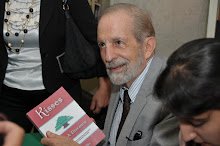If the NRA had its way, everyone would be carrying a gun. "The
only way to stop a bad guy with a gun is a good guy with a gun. Where does that
mantra stop?
 Lost in all the uproar about the potential proliferation of nuclear
technology, and the inevitable acquisition by North Korea and Iran, is the
murky argument against their possession. Why doesn't the nuclear club hold that,
"The only way to stop a bad guy with a nuke is a good guy with a
nuke?"
Lost in all the uproar about the potential proliferation of nuclear
technology, and the inevitable acquisition by North Korea and Iran, is the
murky argument against their possession. Why doesn't the nuclear club hold that,
"The only way to stop a bad guy with a nuke is a good guy with a
nuke?"
The club’s original five members, US, Russia, China, Great Britain,
and France, is now nine or ten,
depending on who’s counting, and who isn't bragging. Pakistan, India, and
Israel are non-signatories of the Nuclear Non-Proliferation Treaty (NPT). North
Korea withdrew its membership in 2002.
The worldwide
total number of 20,000 warheads are aimed at various military targets and
population centers around the globe. Why so many--given that number could
destroy our planet several times over? One can only guess at the brilliance
behind such planning, and it conjures up images of such masterful adventures
such as Vietnam and Agent Orange, and the invasions of Iraq and Afghanistan.
Also, given that these weapons have a limited shelf (or silo) life, and
disregarding the huge cost of building them in the first place, why is there no
discussion of the cost of maintenance and replacement? In 2004 Congress
mandated (but never discussed), the Reliable Replacement Warhead (RRW)
program--“to improve the reliability, longevity, and certifiability of existing
[nuclear] weapons and their components.” Lots of money for defense contractors
involved here.
The two main arguments for the nuke club's stance are that 1) Our
arsenal is a "deterrent" that assures mutually assure destruction
(MAD). No one would dare attack us for fear of retaliation—read annihilation
(or “obliteration” as Hillary Clinton once warned Iran that it faced). This
rationale obviously does not apply to nuclear wannabes Iran and North Korea. 2) These governments who are trying to join
the club are unstable “rogue” states and their weaponry could easily fall into
terrorist hands. This argument has been effective with the American public
because it plays the fear card. A frightened populace has been proven time and
again to be a controllable populace--one that is quite willing to give up basic
freedoms while entrusting their safety to a few “brilliant” bureaucrats.
If nukes are a defensive weapon for us (even though the previous
administration threatened to violate that premise) why wouldn’t they be the
same for every nation? Why would North Korea, or Iran, want to launch what
would amount to a Kamikaze attack on anyone? Surely they know that their
country would be in ashes shortly after such a blunder.
Finally, if our deterrence strategy is indeed sound, then we have
nothing to worry about. In fact it’s so good it should be expanded to include
everyone. Just think, if every country had nuclear weapons then no one would be
attacking anyone else for fear of retaliation, and there would be no wars--because
everyone would be…deterred!
The NRA strategy sounds good to me.




